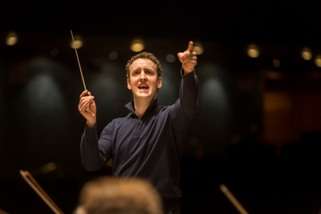|
Back
Silky lyricism and taut brutalism Ottawa
Southam Hall, National Arts Centre
07/29/2015 - & July 27 (Toronto), August 9 (Calgary), 2015
Emilie Cecilia LeBel: monograph of a bird’s eye
Richard Strauss: Concerto in D Major for Oboe and Small Orchestra
Gustav Holst: The Planets, Opus 32
Hugo Lee (oboe)
National Youth Orchestra of Canada, Michael Francis (conductor)

M. Francis
Canada’s National Youth Orchestra again gave a stunning summer performance in Ottawa during late July. As always, the orchestra comprised the cream of top young players, most of them already well launched on careers as orchestral musicians and future teachers. A good deal of the credit this year goes to UK maestro Michael Francis, no stranger to this city, having guest conducted the National Arts Centre Orchestra with brilliance and aplomb last November.
The concert opened with a commission, Emilie LeBel’s monograph of a bird’s eye. Toronto based, Ms. LeBel is composer in residence with the Youth Orchestra this year. A brief programme note offers definitions for both “monograph” and “bird’s eye”, and a quote from Canadian poet Michael Prior’s Condolences, Sparrows: “...And outside the narrow window’s bars, the morning fluttered, sang softly to itself.”
If this seems a tad esoteric, the ten minute work was impressively subtle and sensuous, opening with more delicate percussions instruments, at first quietly and mysteriously – even the wind machine is never used at full blast – and eventually launching a series of sustained sonic episodes. The work is complex and genuinely inventive, though there’s a very clear debt to György Ligeti’s Atmosphères (still best known for its use in Stanley Kubrick’s 1968 film, 2001: A Space Odyssey). This musical monograph definitely held the audience’s attention, and it will be interesting to hear further work from this talented, skilled composer.
Next came Richard Strauss’ Concerto for Oboe and Small Orchestra, composed in 1945 and among Strauss’ later output. The work is lyrical and, typically of the composer, features elaborate developments of brief figures and melodies, the first movement opening with a series of virtual turns on the strings. It proved a splendid vehicle for soloist Hugo Lee, a member of the Youth Orchestra this year, though overall and notwithstanding the work’s finesse and low key luxuriance, the Concerto became a bit dull. Mr. Lee brought the right sweetly lyrical legato and phrasing to his performance and also excelled in the brief cadenzas, one toward the end of the second movement (with clever pizzicato accompaniment) and another toward the final movement’s conclusion.
After intermission, it was Holst’s The Planets, a popular favorite since its earliest performances almost one hundred years ago. The work is about astrology, not astronomy, though from today’s perspective it comes across as a kind of symphonic near death experience, with the moods of different planets pulling and teasing listeners until a diminishing off-stage chorus finally releases us to a new world, if not necessarily the next one.
Conductor Francis was in his element leading this work, and directed a performance which was worthy of an established professional ensemble. The opening movement Mars, the Bringer of War was appropriately brutalist. Venus, the Bringer of Peace was delicately serene; the very brief and soft first desk violin and cello solos were a highlight. Mercury, the Winged Messenger is characterized by Puck-like fidgeting until the strings take a turn dominating this scherzo-like movement. Jupiter, the Bringer of Jollity may be best known of the seven movements and starts with bustling preparation leading to a parade-like march, constant bustling energy, then a march recap with strings. Saturn, the Bringer of Old Age incorporates a variant on Dies Irae leading to an ending more serious than ominous, and possibly suggesting the beginning of a near death experience. Uranus, The Magician, after a fine brass opening soon launches a seeming homage to Dukas’ The Sorcerer’s Apprentice, leading to another march (this one more military, and with ‘canons’ going off, thanks to the percussion), then soft strings before a ferocious, dissonant climax.
The final movement, Neptune, the Mystic, is mainly quiet and taut, until the off-stage chorus (thanks to absent female string players) brings this extraordinary, colorful work to a near silent climax, almost as startling as its brutalist beginning.
The audience clearly demanded an encore, and got a surprise as well as two encores: the players abandoned their instruments and sang folk songs, one from Quebec and the second one, as conductor Francis told us, from Canada’s “eleventh province... England”.
Everyone in bilingual Ottawa appeared to love this.
Is there anything these astounding young musicians can’t do?
Charles Pope Jr.
|